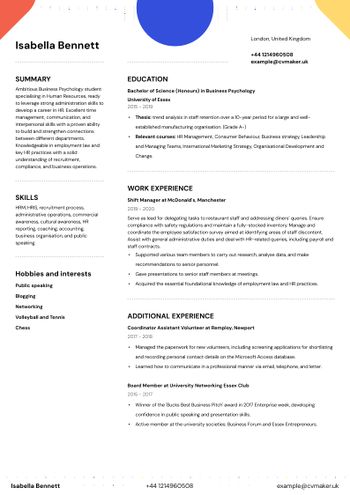When preparing for job interviews, competency-based questions can be among the most challenging to answer. These common interview questions are a key part of the recruitment process across the UK, and mastering them is essential for success.
Whether you're aiming for a role with the NHS, civil service, or companies like Amazon or Apple, understanding how to approach these questions can make a huge difference in your candidacy. We're here to help you gain that crucial insight and build your confidence!
In this article, we cover:
How to prepare for competency-based interview questions
List of competency-based questions with answers
Role-specific questions with examples
Common mistakes to avoid when answering competency-based interview questions.
Scroll to the bottom to download our 'All-in-one job interview checklist!'

Want to get more interviews? Your ideal job is just a well-written CV away!
What are competency-based interview questions?
Competency-based interview questions, also known as behavioural or situational questions, are designed to assess whether you have the sought-after skills and behaviours needed for a specific job. Instead of focusing on hypothetical scenarios, these questions invite you to draw on real-life examples of how you have acted in past situations.
Competency-based interview questions usually reflect the job description and may cover competencies such as:
Decision making
Communication skills
Customer focus
Drive to deliver
Curiosity
Integrity
Building relationships
Attention to detail
Pro tip
Employers use this approach to predict your future behaviour. Your answers should highlight your past competencies, teamwork contributions, and how you've delivered results or improved customer outcomes.
Looking for more interview tips? Read more about how to answer the results-driven interview question.
How to answer competency-based interview questions
The most effective way to answer competency-based questions is to use the STAR interview technique. This method helps you structure your answer by describing past situations and how you overcame them.
S - Situation
Describe the situation and provide context.
“When I was working as a customer service representative, our team faced a sudden surge in support requests during a product launch.”
T - Task
Explain what your responsibility was.
“My task was to manage customer expectations and ensure all queries were resolved within 24 hours.”
A - Action
Detail the steps you took.
“I analysed customer feedback, prioritised urgent requests, and created a shared tracking system to monitor progress.”
R - Result
Share the outcome and what you achieved.
“As a result, customer satisfaction improved by 25% and we reduced response times to under 12 hours.”
Complete writing guides: Customer service CV example and customer service cover letter example.
Pro tip
Use this structure to stay clear and concise while showcasing your contributions and achievements effectively.
Typical competency-based interview questions (with answers)
When applying for certain positions, employers often ask competency-based questions to assess the key skills needed for the role. In this section, you’ll find examples and sample answers to help you confidently showcase your core competencies.
Decision-making
Tell us about a time when you had to make a quick decision with limited information.
"As a project manager, a supplier informed us of a delay just days before launch. I needed to decide whether to postpone the project or find an alternative supplier. I rapidly assessed options, negotiated with a new supplier, and adjusted the project plan. The launch remained on schedule, demonstrating my ability to make sound decisions under pressure."
Complete writing guides: Project manager CV example and project manager cover letter example.
Communication skills
Describe a situation where you had to communicate complex information clearly.
"In my role as a finance business partner, I needed to explain financial forecasts to non-financial stakeholders. I created visual reports, simplified terminology, and encouraged questions. The team understood the data and made informed decisions, leading to better financial planning."
Complete writing guides: Finance CV example and finance cover letter example.
Teamwork
Give an example of how you built a successful working relationship.
"As part of an event management team, a new supplier was reluctant to commit. I set up regular meetings, clarified expectations, and provided constructive feedback. The partnership strengthened and contributed to a successful event, exceeding client expectations."
Complete writing guides: Event manager CV example and event manager cover letter example.
Attention to detail
Describe a time your attention to detail prevented a problem.
"As an accountant, I noticed an inconsistency in a client’s tax return. I investigated, identified a data entry error, and corrected it before submission. This avoided a potential fine and built client trust, improving customer satisfaction."
Complete writing guides: Accountant CV example and accountant cover letter example.
Customer focus
What have you done in the past that has ensured the customer is considered at every level and across all specialisms within your team?
"As a copywriter, I worked closely with designers, account managers, and the digital team to ensure every piece of content reflected the customer’s needs and tone preferences. I initiated audience research sessions to align our creative direction with real customer insights, and I introduced a content checklist that prioritised clarity, accessibility, and brand authenticity."
Complete writing guide: Copywriter CV example.
Drive to deliver
Tell us about a difficult but constructive piece of feedback you’ve received in the past.
"In an early design role, a senior designer told me that my prototypes were visually appealing but didn’t sufficiently address usability and accessibility. It was difficult feedback to hear because I had invested significant effort in aesthetics, but I recognised its value. I arranged user-testing sessions, sought training in inclusive design, and started prioritising function before form in my design process."
Complete writing guide: Product designer CV example.
Curiosity
How do you contribute to building a creative team environment?
"As a research assistant, I help build a creative and collaborative environment by encouraging open discussion of ideas and fostering psychological safety in our research group. I organise short brainstorming sessions before each project to generate hypotheses and invite input from every team member, regardless of seniority. I also share relevant journal articles to spark new thinking."
Complete writing guide: Research assistant CV example.
Integrity
Have you ever challenged a decision taken by your manager or someone senior to yourself?
"As a data scientist, I once challenged a proposal to use a third-party dataset that hadn’t been properly validated for bias. I was concerned it could compromise the accuracy of our predictive model and lead to unreliable recommendations. I gathered evidence showing potential inconsistencies and presented an alternative plan using internally verified data."
Complete writing guide: Data scientist CV example and data scientist cover letter example.
Impact
Tell us about a time when you have changed someone’s mind and encouraged them to do something your way?
"In a previous software development role, a senior colleague was reluctant to adopt automated testing, preferring manual verification. I ran a small proof-of-concept project showing how automated tests reduced bug fixes and improved deployment speed. I explained the long-term efficiency benefits and offered to provide training. After seeing the results, the team fully embraced the change."
Complete writing guide: Software developer CV example.
The Best CV Builder
Effortlessly create a professional CV
Easy to use on any device
Integrated spelling and grammar check
Customisable job-specific CV examples

Examples of common role-specific interview questions with model answers
Competency-based interview questions are tailored to the specific role and industry. Here are some common examples for various positions and fields:
NHS competency-based interview question
Describe a time when you provided exceptional patient care under pressure.
"During a busy shift, we were short-staffed. I prioritised tasks, communicated clearly with colleagues, and ensured patients were updated and reassured. All patients were treated within target times, and feedback praised the quality of care."
Police competency-based interview question
Tell me about a situation where you had to remain calm and make a quick decision.
"Responding to a disturbance, tensions escalated quickly. I used communication skills to defuse the situation, separating the parties and gathering information. The situation was resolved peacefully, demonstrating strong decision-making and professionalism."
Civil service competency-based interview question
Give an example of when you improved a process to deliver better public service.
"Our department’s response time to enquiries was below standard. I redesigned the workflow, introduced clearer guidelines, and trained staff. Response times improved by 35%, enhancing service delivery and public satisfaction."
Accountancy competency-based interview question
Describe a time you provided insight that influenced a business decision.
"I identified cost inefficiencies in a client’s operations. I presented alternative strategies with financial projections. The client implemented changes, reducing costs by 15%."
Administrator competency-based interview question
Tell me about a time you had to manage multiple priorities.
"I was managing three urgent tasks with competing deadlines. I prioritised based on urgency and impact, communicated with stakeholders, and delegated where possible. All tasks were completed on time, maintaining smooth operations."
Amazon competency-based interview question
Describe a time you took ownership of a problem.
"A logistics error delayed several customer orders. I investigated the root cause, coordinated with suppliers, and implemented a tracking solution. Delivery performance improved, and customer satisfaction scores increased."
Team leader competency-based interview question
Tell me about a time when you motivated a team during a challenging period.
"Morale dropped during a difficult project phase. I held team meetings, recognised individual contributions, and adjusted workloads. Productivity improved and the team delivered the project ahead of schedule."
Event management competency-based interview question
Describe how you handled an unexpected challenge during an event.
"A keynote speaker cancelled at short notice. I quickly sourced a replacement, adjusted the schedule, and communicated changes to attendees. The event proceeded smoothly, and feedback was highly positive."
Finance competency-based interview question
Give an example of when your analysis influenced a strategic decision.
"I identified a trend indicating declining profitability. I presented detailed analysis and recommended a shift in pricing strategy. The company adopted the changes and profitability improved within two quarters."
Customer service competency-based interview question
Tell me about a time you turned a dissatisfied customer into a loyal one.
"A client was unhappy with a delayed order. I apologised, offered a solution, and followed up personally. The customer stayed with us and later provided positive referrals."
Project manager competency-based interview question
Describe a project you managed from start to finish and how you overcame challenges.
"A large-scale system upgrade faced budget constraints. I renegotiated contracts, re-prioritised deliverables, and communicated transparently with stakeholders. The project was delivered on time and under budget, demonstrating strong leadership and decision-making."
Mistakes to avoid in competency-based interviews
Even strong candidates sometimes struggle with competency-based interview questions because of avoidable mistakes. Here’s what to watch out for:
Use real-life examples
“In my role as an administrator I redesigned the filing system after a major audit, which reduced retrieval time for documents.”
Give vague answers
“I always work well in a team, as I enjoy collaborating with others, sharing ideas, and contributing to achieving common goals."
Quantify results when possible
“By introducing a follow-up call process, I improved customer satisfaction scores by 18% within six months."
Rely on unsubstantiated claims
"I made customers happier by meeting their needs, exceeding expectations, and making every interaction positive."
Reflect on the result
“The experience taught me a better way to document changes, and I’ve since introduced a one-page brief template used across our team.”
Conclude without reflection
"I was able to fix the issue, which made for a great experience in the end."

Land more interviews with a professional cover letter
All-in-one job interview checklist
 Download this job interview checklist for your next interview in PDF.
Download this job interview checklist for your next interview in PDF.
Competency-based interview questions essentials
Focus on demonstrating your real experiences, not memorising perfect answers.
Show how your skills and behaviours align with the employer’s expectations and the role’s key competencies.
Use the STAR interview method to structure clear, evidence-based responses.
Tailor your examples to the job description and highlight the competencies most relevant to the position.
Emphasise how your actions led to tangible results, teamwork success, or improved customer outcomes.
Reflect on what you learned from each experience to show continuous growth and self-awareness.
Next steps?
Kickstart your job search with our CV templates or customise one of our CV examples to suit your needs. Pair your CV with one of our cover letter templates for a complete application. For personalised assistance, explore our CV Writing Services and get expert guidance on your career documents. For more inspiration and insights, explore our articles on how to answer the 'strengths and weaknesses' question or what your body language says in an interview.
FAQs
How to pass a competency-based interview?
Review the job description and prepare examples that show how your past experiences align with the key competencies required for the role.
Structure your answers clearly by describing the Situation, Task, Action, and Result for each example.
Focus on your specific actions, the skills you used, and the positive results you achieved.
Research the organisation’s values and tailor your examples to show you’re a good cultural fit.
For more inspiration, read our article on how to answer results-driven interview questions.
How do you introduce yourself in a competency-based interview?
When answering the 'tell me about yourself' question in a competency-based interview, keep your introduction brief and relevant. Summarise your background, experience, and key strengths that align with the role. This sets a professional tone and helps the interviewer see immediately how your experience fits their requirements.
“I have over five years’ experience in project management, where I’ve developed strong leadership and problem-solving skills. I’m particularly drawn to this role because it allows me to build on my experience in delivering successful projects within tight deadlines.”
Are competency-based interviews difficult?
Competency-based interviews can feel challenging if you’re unprepared, as they require detailed examples rather than general statements. However, with preparation and practice, they are entirely manageable. Remember: interviewers are assessing your potential to succeed based on your real experiences. For more insights, check out our article on mastering job interviews as an introvert.
Can you fail a competency-based interview?
Yes, it is possible to fail a competency-based interview if you cannot provide clear, relevant examples that demonstrate the required competencies. To avoid this, prepare a variety of examples that highlight your decision-making, communication, teamwork, and problem-solving skills. Practising your answers in advance greatly improves your chances of success. For more guidance, explore our article on how to prepare for a job interview.
)



)
